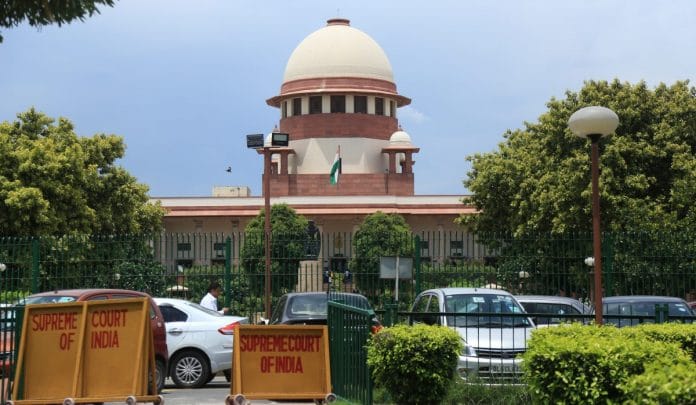New Delhi: The Supreme Court Wednesday allowed a law student to visit his parents in Anantnag district of Jammu and Kashmir and permitted CPM general secretary Sitaram Yechury to meet party colleague Mohammed Yousuf Tarigami, currently detained in the state. The apex court was adjudicating on two habeas corpus petitions filed before it.
Mohammad Aleem Syed, a student from Jamia Millia Islamia University, and Yechury had both approached the court soon after the Presidential order scrapped Article 370 for the state.
Both the petitions were in the nature of the Writ of Habeas Corpus under Article 32 of the Constitution, under which a court can direct a person in detention to be produced before the judges in the courtroom. Detention, as it is understood in a Habeas Corpus petition, need not always be physical and should be enough to curtail individual liberty.
The two petitioners stated that ever since the information and communication blackout was imposed in Jammu and Kashmir, the people they have been looking for are inaccessible.
The court, however, did not discuss the merits of the petition nor did it issue a notice to the Centre questioning the detention. Instead, a three-judge bench led by Chief Justice Ranjan Gogoi allowed both the petitioners to meet their individual parties in Kashmir and inform the court of what transpired during their visit through affidavits.
But what are habeas corpus petitions? Why are they filed and was the SC order on 28 August in line with nature of the petition? ThePrint explains.
What is a Habeas Corpus petition?
Habeas Corpus, a Latin term, essentially means “you must have the body”. This petition filed under Article 32 of the Constitution prays before the court to direct a particular individual or authority who has detained a person to produce the detenu before the court. This petition leads the court to determine the validity of such detention.
Is there a time limit for such a petition to be decided?
In the case of A.K. Gopalan vs Government of India, 1965, the Supreme Court had ruled that the earliest date with reference to which the legality of detention may be examined is the date on which the application is made to the court.
In the two cases before the court, the Jamia Milia Islamia student had filed his plea on 9 August, after waiting for four days trying to speak with his parents, while Yechury filed his plea on 11 August.
Both pleas stated that the media and communication restriction was a violation of the Right to Life and Liberty and that the individuals must be produced before the court.
The basis of this petition is that it is associated with urgency. Article 32 is invoked only when fundamental rights are at stake. Under Article 21 of the Constitution, Right to Life is considered not only sacrosanct but also Right to Liberty. This was a part of the checks and balances put in place by the legislature while enacting the law.
Also read: Delhi High Court asks Centre to respond to Shah Faesal’s plea challenging his detention
What about the legality of the detention?
Although the Supreme Court precedent maintains that legality of the detention will be decided as soon as the application is received by the court, in this case, the SC has not ventured into the legal aspect of the detention. Instead, it has gone ahead and ordered the petitioners to meet the “bodies” in their place of “detention”.
The legality of the detention is connected to the pleas by Anuradha Bhasin, the editor of Kashmir Times, and activist Tehseen Poonawalla, who have challenged the communication blackout in the state. In this case, however, the SC has given the Centre a week’s time to reply on steps taken to ease the situation in Jammu and Kashmir.
The court asked the Jamia Milia Islamia student to report back after travelling to Anantnag and asked the government to provide him with adequate police protection. The SC also allowed Yechury to visit Srinagar on the condition that he would refrain from making it a political visit. Yechury has twice tried to visit Srinagar but was turned back from the airport on both occasions.
In a first for a habeas corpus petition, Yechury also gave an undertaking that he is going to J&K only to meet his colleague and will do nothing else. This after Solicitor General Tushar Mehta argued that the visit will be used for political purposes.
Also read: Supreme Court seeks Centre, J&K govt’s response to plea on media restrictions
Has Habeas Corpus ever been denied in India?
The plea of habeas corpus does not end with only producing the individual under detention before the court but also determines whether the detention was legal or not. In case the court feels the detention was not with the consent of the individual, then such petitions are often dismissed.
For example, in 2014, a Madras High Court bench had permitted a 19-year-old Hindu woman, who converted to Islam and married a Muslim man, to live with her husband after dismissing a habeas corpus petition filed by the woman’s mother.
The mother had moved court stating that the husband had illegally detained her. However, the woman was produced in court and she stated that she was not in detention and that it was of her free will.
Also read: Why BJP and Congress love to hate sedition (till they come to power)






